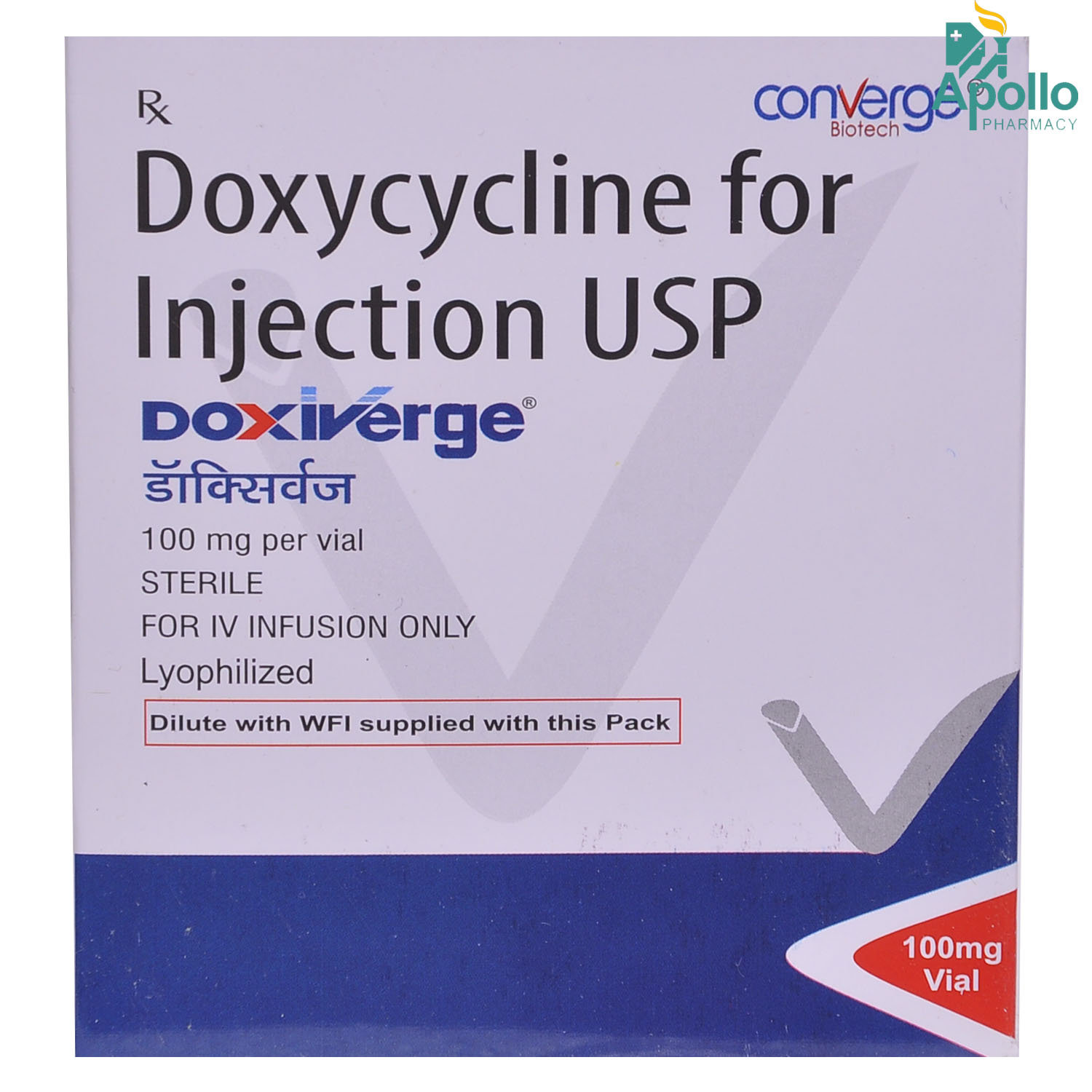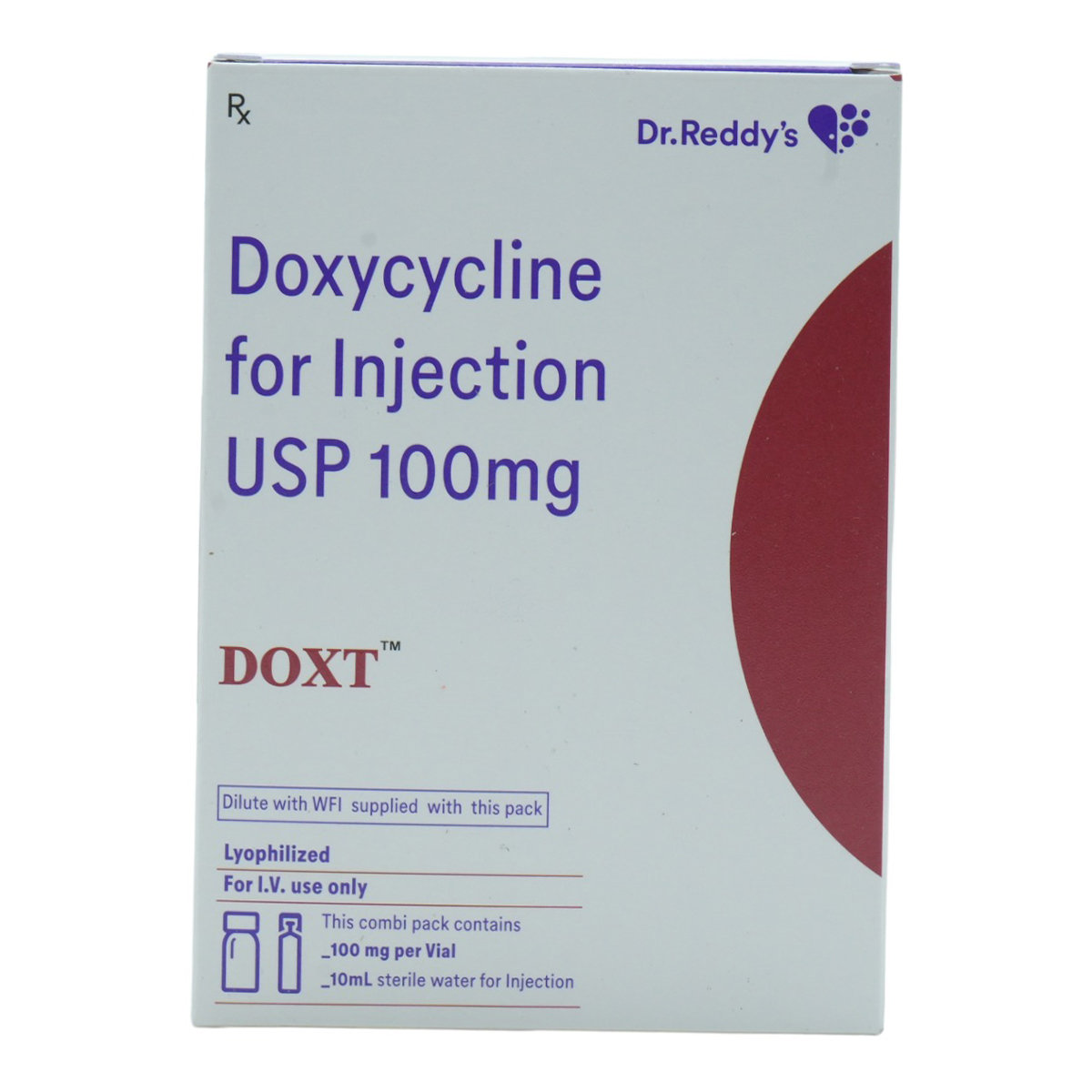Doxific Injection
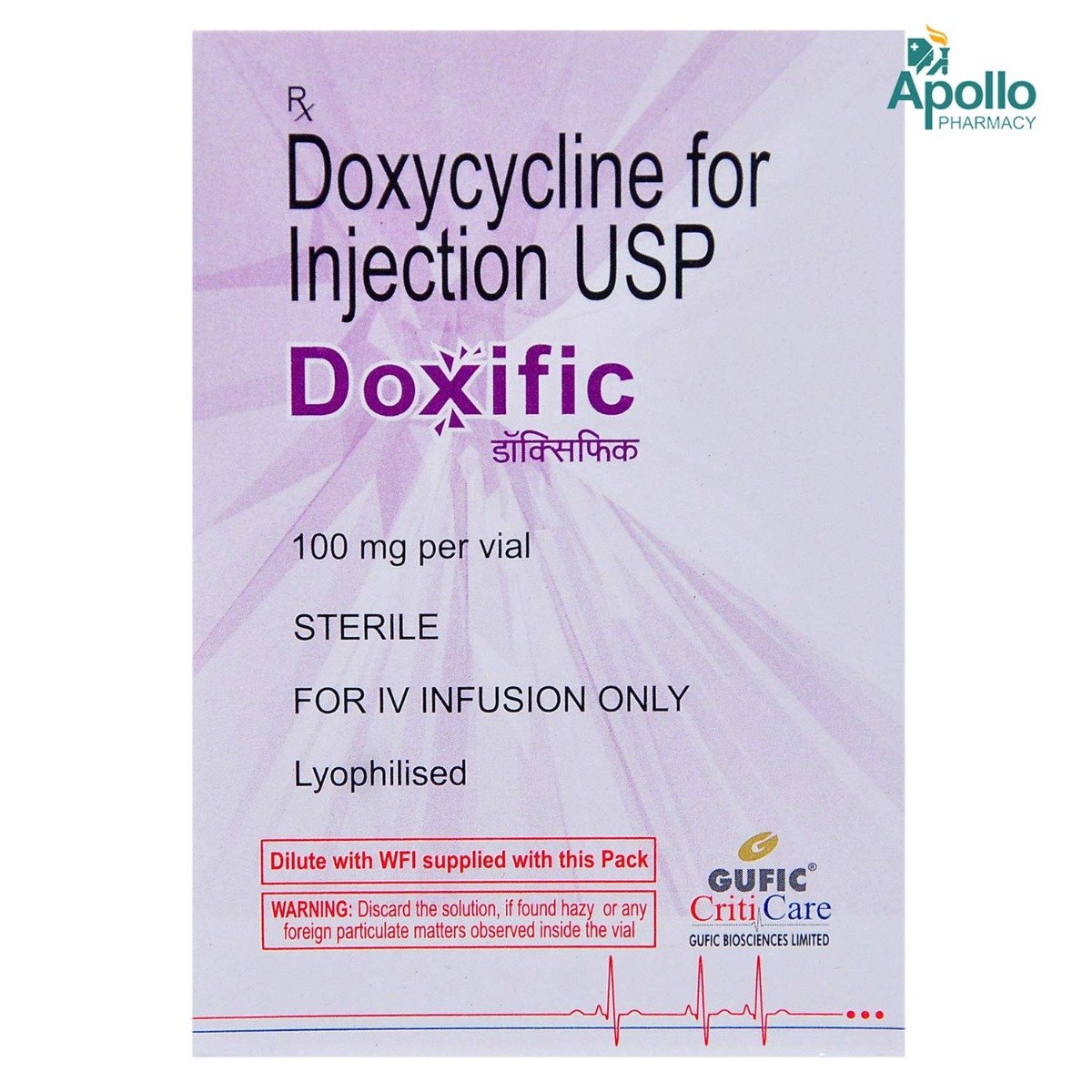


MRP ₹527.5
(Inclusive of all Taxes)
₹79.1 Cashback (15%)
know your delivery time
Provide Delivery Location
Composition :
Manufacturer/Marketer :
Consume Type :
Expires on or after :
Return Policy :

Secure Payment

Trusted by 8 Crore Indians

Genuine Products
Therapeutic Class
Country of origin
Manufacturer/Marketer address
Author Details
We provide you with authentic, trustworthy and relevant information
Disclaimer
Alcohol
Safe if prescribed
It is not known if alcohol affects Doxific Injection. Please consult your doctor if you have any concerns.
Pregnancy
Consult your doctor
Doxific Injection belongs to pregnancy category D. There are no adequate and well-controlled studies on the use of Doxific Injection in pregnant women. In some cases, taking Doxific Injection during pregnancy may affect tooth and bone development in the unborn baby. So, if you are pregnant or planning for pregnancy contact the doctor before using Doxific Injection.
Breast Feeding
Consult your doctor
Doxific Injection is excreted in the breast milk. However, the extent of absorption of Doxific Injection by the breastfed infant is not known. Hence, the nursing mother should consult the doctor before using Doxific Injection.
Driving
Safe if prescribed
It is not known if Doxific Injection affects your ability to drive. Drive or operate machinery only if you are alert.
Liver
Consult your doctor
Doxific Injection is to be taken with caution, especially if you have a history of liver diseases/conditions. The dose may have to be adjusted by your doctor.
Kidney
Consult your doctor
At the recommended doses, Doxific Injection is safe to use in patients with kidney disease if prescribed by a doctor.
Children
Safe if prescribed
Use of Doxific Injection during tooth development in infants and children below 8 years of age may cause permanent staining of teeth (yellow-grey-brown). So, it is not recommended for children below 8 years of age.
Product Substitutes
About Doxific Injection
Doxific Injection belongs to a group of medications called tetracycline antibiotics used to treat bacterial infections such as urinary tract infections, intestinal infections, respiratory infections, eye infections, skin infections, sexually transmitted infections (gonorrhoea, syphilis), and gum infections (periodontitis). Besides this, Doxific Injection may also be used to treat or prevent anthrax.
Doxific Injection contains 'Doxycycline' which stops the growth of bacteria by preventing the synthesis of essential proteins necessary for their survival. Thereby, Doxific Injection helps treat bacterial infections. It is a broad-spectrum antibiotic which is effective against both gram-negative and gram-positive bacteria.
Doxific Injection will be administered by a healthcare professional; do not self-administer. In some cases, Doxific Injection may cause pain, itching, swelling or redness at the site of injection, nausea, vomiting, or diarrhoea. Most of these side effects of Doxific Injection do not require medical attention and gradually resolve over time. Please consult your doctor if these side effects become troublesome.
Do not take Doxific Injection if you are allergic to any of the components. Consult your doctor if you are pregnant or breastfeeding. Use of Doxific Injection during tooth development (last half of pregnancy, infancy, and in children below 8 years) may cause teeth staining (yellow-grey-brown). Keep your doctor informed about your health condition and medications to rule out any interactions/side effects.
Uses of Doxific Injection
Medicinal Benefits Mweb
Key Benefits
Doxific Injection belongs to the class of medicines called tetracycline antibiotics which is effective against a wide range of bacteria, including gram-negative, gram-positive bacteria, anaerobes, and some parasites. It is used to treat respiratory tract infections (influenza, pneumonia), genitourinary infections (syphilis, gonorrhoea), anthrax infection, sinuses, eye, and skin infections. Besides this, it is also indicated in the tick-borne infections (typhus fever) caused by the Rickettsia group of bacteria like typhus fever. Off-label, usage includes the prevention of malaria and the treatment of acne.
Directions for Use
Side Effects of Doxific Injection
- Pain, itching, swelling or redness at the site of injection
- Nausea
- Vomiting
- Diarrhoea
Drug Warnings
Do not take Doxific Injection if you are allergic to any of its contents. Inform your doctor if you have lupus, or if you are pregnant or breastfeeding. Use of Doxific Injection during tooth development (last half of pregnancy, infancy, and in children below 8 years) may cause teeth staining (yellow-grey-brown). Consult your doctor if you experience any skin reactions, fever, muscle, or joint problems.
Drug-Drug Interactions
Drug-Drug Interactions
Login/Sign Up
Coadministration of Acitretin with Doxific Injection can increase the risk and severity of vision problems.
How to manage the interaction:
Taking Acitretin with Doxific Injection together is generally avoided as it can result in an interaction, it can be taken if your doctor has advised it. However, if you experience headaches, nausea, vomiting, and visual disturbances, contact a doctor immediately. Do not discontinue any medications without consulting a doctor.
Coadministration of Tretinoin with Doxific Injection can increase the risk of side effects like vision problems.
How to manage the interaction:
Taking Tretinoin with Doxific Injection is generally avoided as it can possibly result in an interaction, it can be taken if your doctor has advised it. However, if you experience sudden headache, nausea, vomiting, and visual disturbances, contact your doctor immediately. Do not discontinue any medications without consulting a doctor.
Taking isotretinoin with Doxific Injection may increase the risk of a rare condition called pseudotumor cerebri (increased pressure in the brain).
How to manage the interaction:
Although taking isotretinoin and Doxific Injection together can possibly result in an interaction, it can be taken if your doctor has prescribed it. However, consult the doctor immediately if you experience symptoms such as headache, nausea, vomiting, and visual disturbances, consult a doctor. Do not stop using any medications without consulting doctor.
Taking Doxific Injection with etretinate may increase the risk of vision problems.
How to manage the interaction:
Taking Etretinate with Doxific Injection is not recommended, but can be taken if prescribed by a doctor. However, consult a doctor if you experience headache, nausea, vomiting, and visual disturbances. Do not discontinue any medication without consulting a doctor.
Co-administration of Doxific Injection with calcium acetate can reduce its effectiveness.
How to manage the interaction:
Although there is an interaction between calcium acetate and Doxific Injection, it can be taken together if prescribed by a doctor. It is adviced to take Doxific Injection 2 hrs before or 6 hours after taking calcium acetate. Do not stop using any medications without talking to a doctor.
Co-administration of aminolevulinic acid with Doxific Injection may increase the risk of sunburn.
How to manage the interaction:
Co-administration of Doxific Injection with Aminolevulinic acid can possibly result in an interaction, but it can be taken if your doctor has advised it. If you notice that your skin is very sensitive to sunlight or if you have a sunburn, it's important to contact your doctor right away. Do not stop using any medications without first talking to your doctor.
Coadministration of lomitapide with Doxific Injection can increase the risk of liver problems.
How to manage the interaction:
There may be a possibility of interaction between Doxific Injection and Lomitapide, but it can be taken if prescribed by a doctor. However, contact your doctor if you experience fever, chills, joint pain, swelling, skin rash, itching, feeling tired, feeling sick, stomach ache, and dark urine. Do not stop using any medications without first talking to your doctor.
Coadministration of Ketoconazole and Doxific Injection may increase the risk of liver problems.
How to manage the interaction:
Although taking Doxific Injection with Ketoconazole can result in an interaction, they can be taken together if prescribed by a doctor. However, if you experience any symptoms such as joint pain or swelling, skin rash, itching, nausea, vomiting, abdominal pain, dark urine, light stools, and/or yellowing of the skin or eyes, consult a doctor immediately. Do not discontinue using any medications without consulting a doctor.
Taking Doxific Injection with mipomersen may increase the risk of liver problems.
How to manage the interaction:
Although taking Doxific Injection with Mipomersen can possibly result in an interaction, they can be taken together if prescribed by your doctor. However, if you experience any symptoms such as joint pain or swelling, skin rash, itching, nausea, vomiting, abdominal pain, dark urine, light stools, and/or yellowing of the skin or eyes, consult a doctor immediately. Do not discontinue using any medications without consulting a doctor.
Taking vitamin A with Doxific Injection may increase the risk of vision problems.
How to manage the interaction:
Although taking Retinol (vitamin A) together with Doxific Injection can possibly result in an interaction, they can be taken together if prescribed by your doctor. Do not discontinue using any medications without consulting your doctor.
Drug-Food Interactions
Drug-Food Interactions
Login/Sign Up
Drug-Diseases Interactions
Drug-Diseases Interactions
Login/Sign Up
Drug-Drug Interactions Checker List
- ACITRETIN
- ISOTRETINOIN
- WARFARIN
- DIGOXIN
- PHENYTOIN
- CARBAMAZEPINE
- ALUMINIUM
- CALCIUM
- MAGNESIUM
- BISMUTH SUBSALICYLATE
Habit Forming
Special Advise
- Wear sunglasses and sunscreen when you go out in the sun as Doxific Injection can make your skin sensitive to light.
- Maintain a gap of 2 hours between Doxific Injection and iron supplements and antacids as taking them together might affect the working of Doxific Injection.
- Doxific Injection might affect certain lab tests, inform the person doing the tests that you are taking Doxific Injection.
Diet & Lifestyle Advise
- It would be best to take probiotics after completing the full course of Doxific Injection to restore healthy bacteria in the intestine that may have been killed due to the usage of antibiotics. Taking probiotics after antibiotic treatment can reduce the risk of antibiotic-associated diarrhoea. Certain fermented foods like yogurt, cheese, sauerkraut and kimchi can help restore the intestine's good bacteria.
- Include more fibre-enriched food in your diet, as it can be easily digested by gut bacteria which helps stimulate their growth. Whole-grain bread, and brown rice, should be included in your diet.
- Avoid taking too much calcium enriched foods and drinks as it might affect the working of Doxific Injection.
- Avoid intake of alcoholic beverages with Doxific Injection as it can make you dehydrated and affect your sleep. This can make it harder for your body to aid Doxific Injection in fighting off infections.
All Substitutes & Brand Comparisons
RX
Out of StockAndoxy 100mg Injection
₹89
(₹80.1 per unit)
83% CHEAPERRX
Out of StockCapdoxy 100mg Injection
₹476
(₹428.4 per unit)
9% CHEAPERRX
Out of StockIvdoxy Injection 1's
Medicorp Pharmaceuticals India Pvt Ltd
₹495
(₹445.5 per unit)
6% CHEAPER
Buy best Infections & Infestation products by
Cipla Ltd
Macleods Pharmaceuticals Ltd
Alkem Laboratories Ltd
Lupin Ltd
Abbott India Ltd
Sun Pharmaceutical Industries Ltd
Mankind Pharma Pvt Ltd
Micro Labs Ltd
Aristo Pharmaceuticals Pvt Ltd
FDC Ltd
Intas Pharmaceuticals Ltd
Glenmark Pharmaceuticals Ltd
Ipca Laboratories Ltd
Torrent Pharmaceuticals Ltd
Zydus Healthcare Ltd
Biochem Pharmaceutical Industries Ltd
Zuventus Healthcare Ltd
United Biotech Pvt Ltd
Hetero Drugs Ltd
Emcure Pharmaceuticals Ltd
Alembic Pharmaceuticals Ltd
Indoco Remedies Ltd
Fusion Health Care Pvt Ltd
Dr Reddy's Laboratories Ltd
Leeford Healthcare Ltd
Cadila Healthcare Ltd
Wockhardt Ltd
Zydus Cadila
GlaxoSmithKline Pharmaceuticals Ltd
Morepen Laboratories Ltd
Blue Cross Laboratories Pvt Ltd
Cadila Pharmaceuticals Ltd
Converge Biotech Pvt Ltd
Elder Pharmaceuticals Ltd
Hetero Healthcare Pvt Ltd
Pfizer Ltd
AAA Pharma Trade Pvt Ltd
Gufic Bioscience Ltd
Mylan Pharmaceuticals Pvt Ltd
Corona Remedies Pvt Ltd
Wallace Pharmaceuticals Pvt Ltd
Apex Laboratories Pvt Ltd
Medishri Healthcare Pvt Ltd
Akumentis Healthcare Ltd
Alniche Life Sciences Pvt Ltd
Hegde & Hegde Pharmaceutica Llp
Veritaz Healthcare Ltd
Ranbaxy Laboratories Ltd
Koye Pharmaceuticals Pvt Ltd
Shreya Life Sciences Pvt Ltd
Overseas Health Care Pvt Ltd
Biocon Ltd
Indchemie Health Specialities Pvt Ltd
Medley Pharmaceuticals Ltd
Brinton Pharmaceuticals Ltd
J B Chemicals & Pharmaceuticals Ltd
Unifaith Biotech Pvt Ltd
Ajanta Pharma Ltd
Biochemix Health Care Pvt Ltd
Natco Pharma Ltd
Samarth Life Sciences Pvt Ltd
Unichem International
Laborate Pharmaceuticals India Ltd
Unipark Biotech Pvt Ltd
Zymes Bioscience Pvt Ltd
Indiabulls Pharmaceuticals Pvt Ltd
Neon Laboratories Ltd
Vasu Organics Pvt Ltd
DR Johns Lab Pharma Pvt Ltd
East West Pharma India Pvt Ltd
La Renon Healthcare Pvt Ltd
Medgen Drugs And Laboratories Pvt Ltd
Novartis India Ltd
Canixa Life Sciences Pvt Ltd
Icarus Health Care Pvt Ltd
Lincoln Pharmaceuticals Ltd
Celon Laboratories Pvt Ltd
Concept Pharmaceuticals Ltd
Klm Laboratories Pvt Ltd
Nicholas Piramal India Ltd
Systopic Laboratories Pvt Ltd
Yuventis Pharmaceuticals
Capital Pharma
German Remedies Ltd
Pristine Pearl Pharma Pvt Ltd
Unison Pharmaceuticals Pvt Ltd
Aurz Pharmaceutical Pvt Ltd
Clover Health Care Pharma
Kepler Healthcare Pvt Ltd
Allites Life Sciences Pvt Ltd
Auspharma Pvt Ltd
Intra Life Pvt Ltd
Jolly Healthcare
Linux Laboratories Pvt Ltd
Ozone Pharmaceuticals Ltd
Cachet Pharmaceuticals Pvt Ltd
Comed Chemicals Ltd
Delcure Life Sciences Ltd
Fresenius Kabi India Pvt Ltd
Khandelwal Laboratories Pvt Ltd
Frequently Bought Together


_0.jpg?tr=q-85)


